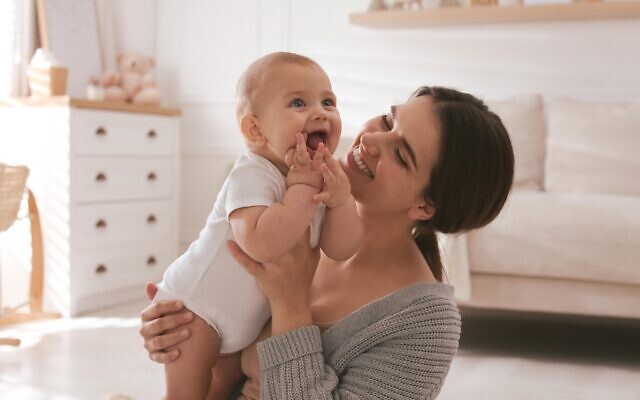Making Sense of the Sedra: Tazria-Metzora
The Torah cares for birthing mothers
Rabbi Ariel Abel is based in Liverpool
Last month, the NHS announced a programme to roll out specialist treatment centres for birthing mothers with serious medical concerns. These 17 new centres of excellence will help women with any pregnancy-related issues to quickly get the extra care they might need.
This week’s Torah double-bill reading, Tazria-Metzora, opens with a prime medical, health and welfare concern in the community: birthing mothers. The reading focuses on a mandatory period of convalescence for mothers. They range from 40 to 80 days for a boy or a girl born, respectively. The Bene Israel Jews of India and the Beta Israel Jews of Ethiopia are two communities left who fully observe this period. Additionally, the Sephardic Jews of the era of the Inquisition in Latin America continue to observe 40 days, although not 80, for both boys and girls. My wife had previously observed this period, which was called ‘la dieta’. She was astonished and disappointed to find that in the UK Orthodox community, other than the traditional wait for the ‘unclean’ days of menstruation to be over, there was no respect shown to the Torah-mandated days of convalescence. The post-partum days are referred to in the Torah as days of ‘purification’ and cleanliness. That time is to recover to avoid the pollution of the outdoors, to be taken care of for all one’s meals, and to eat foods that assist the repair of body and soul. My wife retells the practice, which without supporting family is almost impossible to observe under the stresses of fast-paced urban life. An important food served during this time is chicken soup.
Outside of Judaism, this observance is predominant in this country among Muslims. The ways of the Near and Middle East are our roots, which we have forgotten. Regaining this ground requires reconnecting with home and community in new ways. The Charedi community has taken steps in that direction by setting up a seaside respite centre to serve birthing mothers. Women need peace, space and to be unpressured, so that they and their children can bond.
The NHS affords the public the luxury of some dedicated birthing suites, in one of which a child of ours was born. We enjoyed the peace of a four-bed dedicated birthing centre, with a vista of the Pennines before us. The experience was calming and reassuring, all at once. By contrast, the birth of our next child was somewhat traumatic. Whereas it was very medically safe, in a hospital, the atmosphere was very medicalised and at some point became distressing. The after-effects of the less-than-positive experience impacted upon us as a family for up to three years beyond the events of the day.
Levels of medical care, just as other communal services, are only as good as they ought to be when they are not only technically up-to-grade but also experientially positive. The impact on users of service last way beyond the day of discharge. Perhaps that is why the Torah enshrines the importance of convalescence, and does not talk about when the wife will next be available to resume relations with her spouse or run her home. The priorities of Torah are a woman’s relationship with herself, then with God, first; a message contrary to misogynistic presumptions about religion.
This piece is dedicated to Lielle Emma on her third birthday

Thank you for helping to make Jewish News the leading source of news and opinion for the UK Jewish community. Today we're asking for your invaluable help to continue putting our community first in everything we do.
For as little as £5 a month you can help sustain the vital work we do in celebrating and standing up for Jewish life in Britain.
Jewish News holds our community together and keeps us connected. Like a synagogue, it’s where people turn to feel part of something bigger. It also proudly shows the rest of Britain the vibrancy and rich culture of modern Jewish life.
You can make a quick and easy one-off or monthly contribution of £5, £10, £20 or any other sum you’re comfortable with.
100% of your donation will help us continue celebrating our community, in all its dynamic diversity...
Engaging
Being a community platform means so much more than producing a newspaper and website. One of our proudest roles is media partnering with our invaluable charities to amplify the outstanding work they do to help us all.
Celebrating
There’s no shortage of oys in the world but Jewish News takes every opportunity to celebrate the joys too, through projects like Night of Heroes, 40 Under 40 and other compelling countdowns that make the community kvell with pride.
Pioneering
In the first collaboration between media outlets from different faiths, Jewish News worked with British Muslim TV and Church Times to produce a list of young activists leading the way on interfaith understanding.
Campaigning
Royal Mail issued a stamp honouring Holocaust hero Sir Nicholas Winton after a Jewish News campaign attracted more than 100,000 backers. Jewish Newsalso produces special editions of the paper highlighting pressing issues including mental health and Holocaust remembrance.
Easy access
In an age when news is readily accessible, Jewish News provides high-quality content free online and offline, removing any financial barriers to connecting people.
Voice of our community to wider society
The Jewish News team regularly appears on TV, radio and on the pages of the national press to comment on stories about the Jewish community. Easy access to the paper on the streets of London also means Jewish News provides an invaluable window into the community for the country at large.
We hope you agree all this is worth preserving.






















